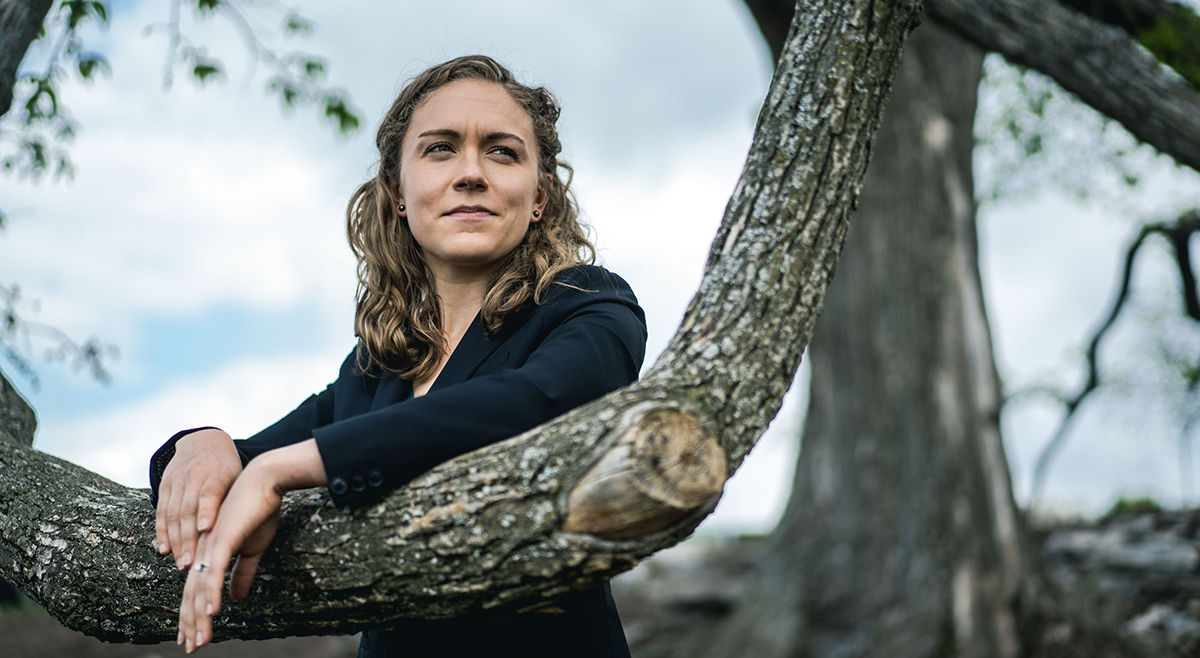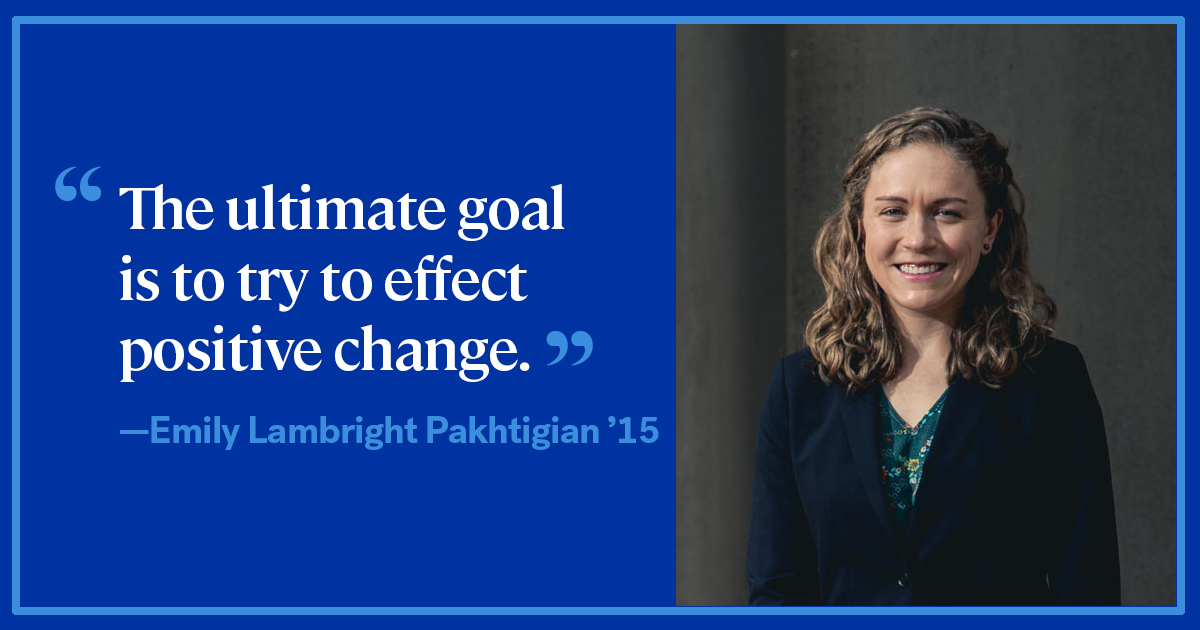Undaunted
Whether in academics, sport, music, or navigating a developing country, Emily Lambright Pakhtigian ’15 achieves imposing goals.
By Anndee Hochman
Photographs by Bill Cardoni
One summer afternoon in Dhaka, Bangladesh, Emily Lambright Pakhtigian ’15 wasn’t sure she’d be able to get from here to there.
A rickshaw was bumping her from the cholera hospital, headquarters of her work on public health and water quality, to another area. She didn’t speak Bangla; she couldn’t read the signs. “We were on the way, and then the driver stopped and said, ‘I can’t go any farther.’ I looked around; there was no road—just a huge hole in front of us and people digging. I knew where I’d started and where I wanted to end, but I had no idea where I was.” She climbed out of the rickshaw, maneuvered her way on foot around the construction project, and found some helpful strangers who recruited another driver to take her to her destination.
The incident was emblematic of the challenges, for Westerners, of navigating the unpredictable infrastructure of Bangladesh. But it’s also a telling narrative about Pakhtigian, a modern-day Renaissance woman who has spent her life setting ambitious goals—in academia, in athletics, in music—and figuring out how to reach them.
At Moravian, where she graduated summa cum laude with a double major in political science and economics, Pakhtigian also played principal oboe in the orchestra and starred in track and cross country, making the Academic All-America NCAA Division III Women’s Track & Field/Cross Country First Team in her senior year.
“Emily was one-of-a-kind,” says Jesse Baumann, director of men’s and women’s track and field and cross country. “I’ve never had an athlete exceed the workload she shouldered—tutoring, performing with the orchestra, traveling to Bangladesh for her research, and working as a teacher’s assistant—all while she pursued a double major and competed as a three-sport athlete. Despite all this, she never complained about how much was on her plate, and she juggled all of it at an exceptionally high level, which left her teammates and our coaching staff in awe.”
Seeds of Passion
Pakhtigian can trace all her passions back to childhood. Raised in Chalfont, Pennsylvania, the daughter of two schoolteachers, she played soccer, field hockey, and basketball but didn’t excel. “It was pretty apparent that coordination wasn’t my strong suit,” she says with a laugh. “Distance running became my athletic pursuit.”
She loved the physicality of running, the effort to compete against others and with herself, the blend of solitude and companionship that came with being part of a team. She ran cross country and track through high school.
In the meantime, she played oboe, an instrument she had started in fourth grade when she fell in love with its sound. The music teacher had tried to steer her toward the clarinet instead, but Pakhtigian just became more determined. With her parents’ support, she learned oboe, eventually joining her high school’s band and accompanying her grandmother as she played hymns on the piano.
For a while, she wanted to be a veterinarian, but later she found herself drawn to history and the social sciences. While touring colleges, she sat in on an economics class and loved how the discipline combined quantitative analysis and human decision making.
Bound for Moravian
Pakhtigian wanted to attend college close to home; she sought a school where she could be an athlete without having the sport consume all of her energy. “I liked that Moravian had a strong music program,” she says. “I was excited about it being a small liberal arts school.”
She likes to tease her parents by saying that she moved herself into college—mostly true, because her early move-in (for preseason training) coincided with her parents’ first in-service day for the coming school year. A high school friend drove with Pakhtigian and helped unload her belongings.
“I decided I wanted to pursue economics or political science,” Pakhtigian says, and after working with her academic advisor, Associate Professor of Economics Sonia Aziz, she narrowed her focus to environmental and developmental economics.
She ran year-round—cross country in fall, track in winter and spring—and joined the orchestra as one of two oboe players.
Cross country and track practices happened every day from 4 to 6 p.m.; the orchestra rehearsed on Monday nights. If she had to miss training, she would run—sometimes with her coach alongside—at 6 a.m.
“I would say there were certainly times when I felt stretched,” she says. “But I was fortunate to have great coaches and faculty mentors. The community was very supportive.”
In fact, she says, her pursuits dovetailed. Running offered relief from academic pressure plus the sustaining company of teammates. Orchestra brought a different kind of reprieve—the beauty of a Debussy nocturne, the joy of performing alongside classmates and community members. All of it, academics included, called for structure and strict time management.
“One thing I would take away from participating in cross country or practicing the oboe is having a sense of discipline,” she says, the idea that “I have a goal I’m going to set, and these are the repetitive steps I need to take to achieve that goal. That can be a lot more challenging in academics.”

“Emily was my undergraduate advisee, and we remain in touch through partnerships on external grants. Her ability to use her training and research to advance a robust research agenda is extraordinary. She is an excellent communicator of complicated science and policy, and a natural leader. I look forward to reading her findings in the environmental and development economics domains in the coming years.”
—Sonia Aziz, associate professor of economics
On to Bangladesh
The summer after her junior year, Pakhtigian spent five weeks working with Aziz and the International Centre for Diarrhoeal Disease Research, Bangladesh, a health research institution, doing house-to-house data collection to determine interest in an in-line water chlorinator that would help improve water quality. She stayed in a guest house owned by the research center and, to keep up her training, ran in a park across the street.
“The idea is that if you treat water as it’s coming out of the hand pump, the water will be cleaner and safer to drink, and people don’t have to go home and clean the water,” she explains. Some members of the team focused on the technology: making the pump simple to use and repair. Pakhtigian worked on the social science aspect of the project: helping with household surveys in two of Dhaka’s poorest areas, asking people about their need and willingness to pay for cleaner water.
She’d never been to that part of the world, she says, and Bangladesh was eye-opening. The work made her consider the real-world logistics and implications of academic research, and the relationship between data and people’s lives. As a runner, she understood the importance of hydration; in Bangladesh, she saw the health effects of living with contaminated water.
“It really reinforced to me that this was a space where I wanted to be working. Each time I go back to South Asia, I remember that there are reasons I am pursuing these questions. The ultimate goal is to try to effect positive change.”
Reaching Farther
Back at Moravian for her senior year, Pakhtigian wrote an honors thesis on water quality in Bangladesh. She also applied to graduate school, another stretch into the unknown. “I like to plan what I’m going to do, so times of uncertainty are the hardest. There were a lot of moments when I was questioning what I was doing.” She used a spreadsheet to keep track of grad school applications, along with her usual Post-It note reminders of things to do.
In July 2015, she married Mason Pakhtigian, whom she’d known since high school. He works in human resources and—goaded by Emily—trained with her for the 2017 Raleigh [North Carolina] City of Oaks marathon.
In recent years, Pakhtigian has returned to South Asia many times to research how people respond to environmental challenges such as air pollution, inadequate sanitation, and contaminated water. In May 2020, she completed her PhD at Duke University; in the fall, she joined the School of Public Policy at the Pennsylvania State University as an assistant professor. She still runs almost every day for fun and stress relief; she plays oboe at her church.
There are moments, still, when all her passions seem to meld. Recently, while on the academic job market, Pakhtigian worked with a professional mentor on presentation skills and style. Her talk was about air pollution in Indonesia. The mentor’s first question after the presentation was, “Do you run?”
“She said, ‘You have a lot of energy, you keep really good eye contact, and you’re fun to watch. It’s clear you’ve done things that require stamina and performance.’”
Anndee Hochman is a journalist, essayist, and storyteller. Her column, The Parent Trip, appears weekly in the Philadelphia Inquirer, and her work has also been published in Poets & Writers, Broad Street Review, Purple Clover, and other print and online venues. She is the author of Anatomies: A Novella and Stories as well as an essay collection, Everyday Acts & Small Subversions: Women Reinventing Family, Community and Home.

